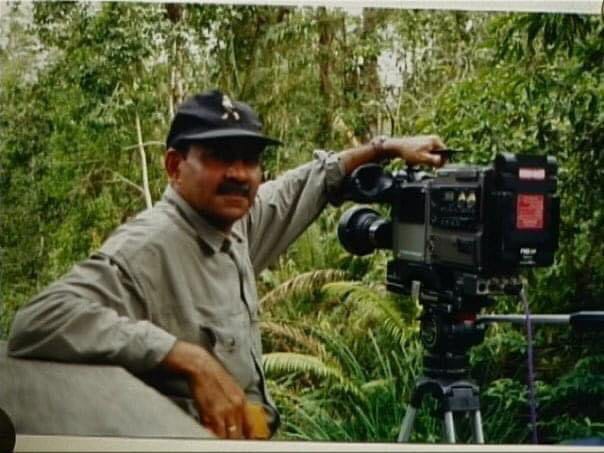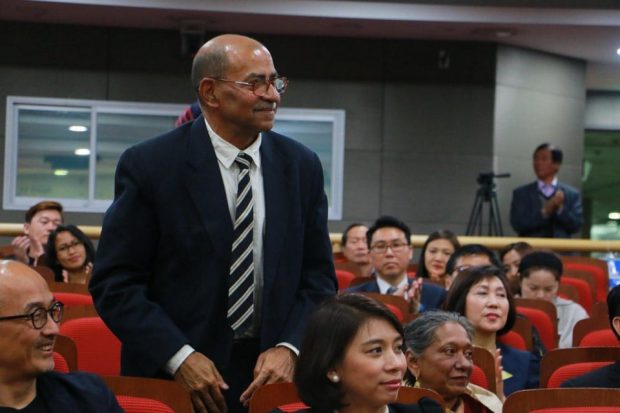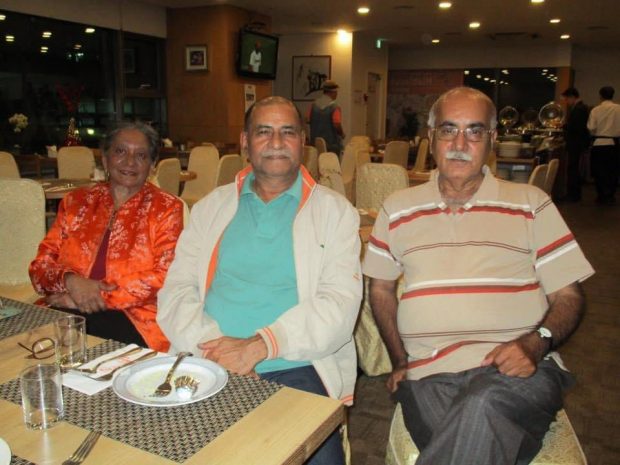AJA mourns veteran reporter, producer and director Pramod Mathur

Pramod Mathur in action
SEOUL: Asia Journalists Association (AJA) has mourned the passing away of Pramod Mathur, a towering media figure who devoted over 50 years to producing and directing news, news features and documentary films on social and cultural issues for national and International broadcasters.
After undergoing a post-graduate course in journalism, Pramod Mathur started his career with hard-core exposure under Visnews (now Reuters). He traveled for six weeks in the midst of the Bangladesh war and its aftermath. It was an experience that shaped his attitude towards capturing humanity on film and video.
According to his account on LinkedIn, the early years were devoted to news and features on a wide spectrum of issues – politics, development, science and culture. During this period, he also participated in establishing the Dateline School of Journalism in New Delhi, which was the stepping-stone for many well-known journalists today.
Over the years, Pramod Mathur was associated in various capacities as Field Producer, Director and Director of Cinematography with leading international organizations, including ZDF, Tellux, Transtel in Germany, UNEP in Switzerland, Columbia Pictures Television Division, and the TV Division of the National Geographic Society, USA.
“I have lost a wonderful Indian friend on June 2. He was more serious than anyone else in his manner of dealing with things or people, and he was a true lover of both nature and people,” Sang-ki Lee, the founder of AJA said as he shared news of his passing away with AJA members.
“Born in India in the middle of the 20th century, Pramod loved his nation and the skyline of India more than anyone else throughout his life. He was both a humanist and a naturalist. I first met him in Seoul in October 2008. Now I am recalling the past 12 years of memories of him in the wake of his death.”

Pramod, Korean National Assembly, April 2016. Left (Jun-Ik Lee, film director) Right (Jasmine Lee, MP). These two people were the person of the year 2016.
Sang-ki said he learned about the loss from Pramod’s wife and lifelong media partner Nilima Pramod.
“Pramod passed away yesterday,” her text message said.
“It was just four words, but these four words brought back 12 years of memories that he and I shared,” Sang-ki said.
“From his first e-mail in 2010 until May 11, I found dozens of conversations, including emails, and messages on WhatsApp and Facebook. The last time he sent me was a short message on April 28, saying, ‘If the AJA General Assembly is held in June, I’m afraid it’s too early for me to attend.’ I responded with a message to invite him to attend as the forum was postponed to October. And now he’s gone on a long journey that will never bring him back.”
Sang-ki said the first time he met Pramod was in October 2008. His business card at the time said Spotfilm CEO, and it remained unchanged.
“That year, the Asian Journalists Association performed a ‘Stop CO2’ performance at the forum and at DMZ under the theme of ‘Climate Change and the Role of Asian Journalists.’ Pramod personally produced a video of the Himalayan glacier melting and explained it to the audience. The 10-minute video drew attention from 200 people in the audience, including more than 100 journalists from Asian countries.”
Pramod also narrated how he nearly died in the Himalayas several times to produce the film.
“As we got along very well during our first meeting, he and I had two more chances to meet afterwards. The last time I met him was in Korea in April 2016. At that time, he stayed in Korea for more than a week,” he said.
“He shared with me many stories. In particular, he told me about his experience of being dispatched as an Indian media reporter during the third India-Pakistan War (1971). He was pondering the reason why he compared Tagore and Manhae in his 2014 contribution to the Asian N and remarked ‘These are the people who lit the lamps of the future.’”
Pramod left Delhi, where he lived for decades, with his wife, Nilima Matu, who worked as an editor for a local newspaper, more than a decade ago and settled in Uttrakhand, a highland. The couple held an eco-festival every spring at their new place.
“He used to express his apologies for not being able to attend the AJA General Assembly held at the same time. He used to say ‘Mr. Lee, I can’t attend in person, but I’m rooting for you with Nilima. Let us respond strongly to global climate change, one of the founding purposes of Aza. I’m rooting for you again. Cheer up!’ He wrote the articles more enthusiastically than anyone else on the online page of Asia N, which was first established in 2008, and Magazine N, which was launched in 2013. At first glance, it was one in two months,” Sang-ki said.
“What’s more welcome and surprising was that his subject was focused on these places. Most of them are the problems resulting from India’s caste system, the policy direction of the Modi government, how to get along well with Pakistan, kindergarten education in India, and desirable diplomatic directions between Korea and India.”

Pramod flanked by Neelima, Wife, (on his right) and Nazir Aijaz, AJA Pakistan Editor (on his left)
Pramod’s last contribution to the online page of Asia N, “COVID-19 Pandemic and India”, was posted slightly more than two months ago, on March 29.
Other contributions included “Education in India”, “The Menace of Fake News”, “Woes of the Third Generation Asians”, and “Climate change: India and Donald Trump”.
Sang-ki expressed regret that the AJA community would no longer be able “to meet our most sincere friend and to read the high-quality columns and articles of the eternal journalist Pramod.”
“In AJA WhatsApp’s group chat room announcing his death, countless members are mourning his death yesterday and today. They spoke the same voice, expressed the same grief. ‘Such a good friend has left us. His goodness will remain. May God bless him and his family,’ they said.”



















































